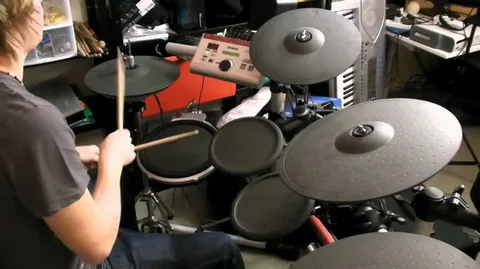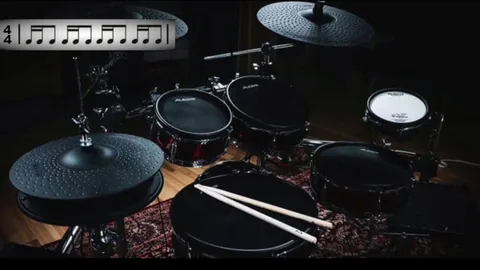The Rise Of Electronic Drums | Trend Or New Norm?
Over the years, every art form has changed heaps, and with it, the introduction of new technology has impacted real transformations. Nowadays, many musicians prefer electric drum kits over traditional ones, but the older generation feels quite skeptical about them. If you are looking into getting set, you might have your own set of queries such as, Is it worth investing in an electronic drum kit? or Is playing on an electronic kit more challenging? Other drummers may wonder, What are electronic drums not good for? or Why do not all drummers play on electronic drums? We help answer these queries in this piece, giving information on the advantages or disadvantages and help you come to a conclusion about whether or not you should get an electric drum set.
What Are Electronic Drums Not Good For?
The short and simple answer? Depends on your practice habits. electric kits provide everything from ease to headsets as a bonus, however, it doesn’t come for free- If you happen to have no defined practice structure, goals, or if your style is quite vague, then it will be hard to derive value from them. Let’s delve into how to fully benefit from them.
1. Volume Control | A Drummer’s Best Friend
One of the notable benefits of electronic drums is volume control. Acoustic drums are very heavy and difficult to play within an apartment or a shared space. As long as electronic drum kits come with a headphone jack, you are free to practice in silence.
2. Compact and Space-Saving
Not only do regular drum kits come with a lot of parts, they are heavy too unlike electronic kits which are relatively easier to handle. And unlike traditional drum kits, many electronic ones are foldable for easier storage which is very helpful for drummers who live in tight spaces.
3. Versatile Sounds at Your Fingertips
When compared to acoustic drum kits, electronic ones make it easier for you to change between different drum sounds with just a click. You can have a classic rock tone whenever you want, and the electronic kit can also switch to jazz brush snare just as quickly. The possibilities are endless, making it a true staple in the world of creativity.
4. Recording and Connectivity
Electronic drums are compatible with almost any DAW software as well as any recording software. If you are looking to record a well defined stencil of a drum track electronically without using microphones or recording tools, you will have no trouble.
5. Quieter Techniques for After-Hours Kits
A challenge for many drummers is when and how they will be able to practice. An electronic kit solves this problem by bringing two features together- minimal noise and playing at any hour. This is very helpful to university students and working professionals who live in shared accommodation.

What Are the Cons of Electronic Drums?
Under certain situations, some drummers might find drawbacks in drums kits that are electronic.
1. Less Natural Feel
Easily, the biggest criticism of online drum kits is that they do not sound like real acoustic drums. The mesh or rubber tops of the drums are not very responsive nor do they have any level of bounce when compared to real drumheads.
2. Durability Concerns
Acoustic drums, when properly maintained over time, can last a lifetime. On the other hand, electronic kits must fully rely on electronic parts that are prone to wearing out. Pads, cables, and modules will gradually fail, getting broken over time creating costly repairs for replacements.
3. Limited Dynamic Range
Even with advanced technology, electronic drums still struggle to match the range acoustic drums are able to cover, especially in sensitivity. The best models are responsive, but not all of them capture the faint touch of the drummer.
4. Cost and Upgrade Path
Affordability is not necessarily an issue when buying electronic kits, but high quality versions are just as pricey as professional acoustic drum sets. Furthermore, many companies have proprietary hardware which makes compatibility utterly impossible, driving the price of upgrades for electronic drum kits through the roof.
5. Power Dependency
Unlike acoustic drums that can be used anywhere, electronic drums require power to operate. This creates an inconvenience in the form of not being able to have spontaneous jam sessions in the park or at unplugged gigs unless a power source is conveniently present.
Are Electronic Drums Harder to Play?
This is a question that many drummers who normally play acoustic sets often inquire when using electronic kits. What is often meant by “harder” will help determine the answer.
1. Adjusting to Different Rebound
Almost every electronic drum pad, especially rubber, differs from akimbo drumheads in feel. Even though offering more rebound, mesh heads make many drummers still take up to a considerable time to adjust.
2. Sensitivity Variations
Unlike cheap models that do not capture subtle ghost notes, low rimshots, or dynamic shifts, quality electronic drums are highly responsive.
3. Trying A Fresh Set Of Tasks
Like all other instruments, Ben Wayne’s electric drums require proper techniques in order to be played. A few of them include the brushwork technique and dynamics.
Still, an adjustment can be made, and once it is, playing the electronic sets can feel just as native as an acoustic kit.
Why Is The Electronic Drum Not Popular Among Drummers?
If using electric drums is so effortless, what’s stopping professional drummers from switching to these kits instead of the acoustic ones?
1. Missing The Acoustic Touch
While the natural overtones, vanity, and room interaction of an acoustic kit can be imitated with other tools, it is still somewhat impossible to replicate an actual drum set digitally, even at the peak of the Everest ie. the technological age.
2. Restrictions During Live Performances
Even though electric kits are best for pre-recording and hearing one’s own practice, they can be a hindrance when performing in front of a crowd. A few drummers have expressed a sense of disconnection from their sound when functioning with an electric kit. Another issue is that plenty of venues don’t offer the required amplification and monitoring tools.
3. Lack Of Cords And Power Sources
There are certain disadvantages to electric kits such as removing cords, sources of power, and software. Anytime there is a performance, any of these could cause shocking problems or total silence. None of these blunders occur while using acoustic drums.
4. Emotion and Story
Drumming is an experience, and not just an auditory one. A large number of drummers appreciate the full-bodied sound offered by an acoustic kit and they appreciate how it reacts to their playing.
Buying A Digital Drum Set
If you’re still sitting on the fence, think about these questions:
Is there a need for a silent practice option? If there is a noise issue, then you will find an electronic sound to be very useful.
Do you spend most of your time playing music in a studio? If you do record a lot, the electronic drums provide ease in setup, access, and recording.
Do you want a drum set that has an abundance of options? If you enjoy trying out new things, electronic kits come with many different drum sounds in one set.
Are you going to play live shows? If yes, then an acoustic kit is more suitable in terms of accuracy and dependability.
What Is The Value of Electronic Drums?
There is no doubt that electronic drums are a wonderful resource, but they might not suit everyone. For those who require quiet means of practicing, appreciate digital flexibility, and easy mic placement, they most certainly are. On the other hand, those who have grown attached to an acoustic drum kit and play gigs regularly may find solace in traditional drums.
In the end, your needs as a drummer will be the deciding factor. It doesn’t matter if you choose an electronic kit, an acoustic one, or a hybrid kit, just remember to keep doing what drummers do best; create music.




Post Comment